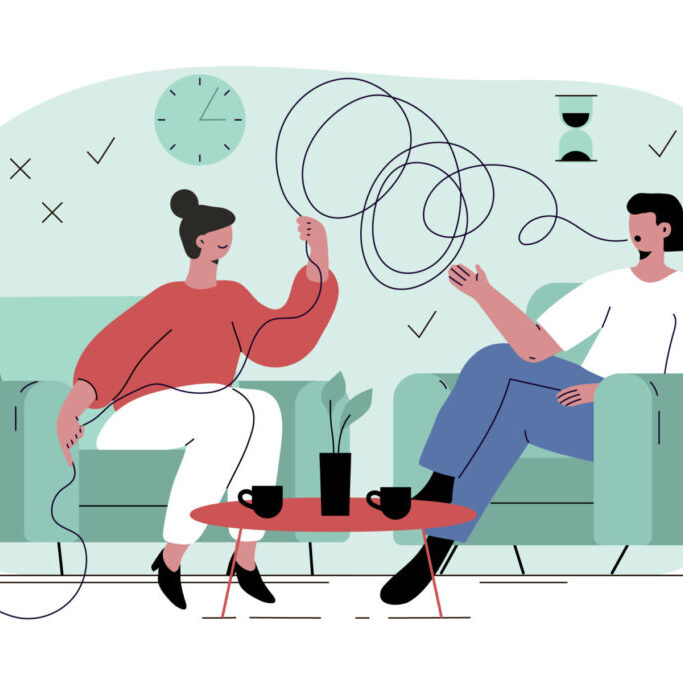How Do I Know If Therapy Is Working

Embarking on the journey of individual therapy is a brave step towards self-discovery and healing. But people who are new to therapy and some who have been with their therapist a long time ask, “How do I know if therapy is working?” Let’s take a look at ways to explore the answer to that question for yourself.
The Therapeutic Alliance: A Foundation of Effective Therapy
The therapeutic alliance is the heart of successful therapy. Here are some aspects to consider:
- Honesty and Openness: The ability to be honest with your therapist is crucial. It’s not just about sharing the easy stuff but also about trusting them with your vulnerabilities. Over time, this honesty fosters a deeper understanding and effectiveness in therapy. It’s a sign that you are comfortable with your therapist and that the therapy is likely heading in the right direction.
- Feeling Understood: Your therapist should ‘get’ you. This means feeling that they understand your experiences, emotions, and thoughts. When your therapist aligns with your treatment goals and seems to genuinely comprehend your perspective, it contributes significantly to the effectiveness of therapy. This understanding is a cornerstone of a strong therapeutic relationship and an affirmative answer to the question, “How do I know if therapy is working?”.
- Challenging Yet Supportive: Effective therapy often involves navigating through uncomfortable territories. Your individual therapist should guide you through these challenges in a way that feels supportive, not overwhelming. This balance between being challenged and feeling supported is key to effective therapy. It indicates that your therapist is successfully facilitating your growth while providing the necessary support.
Increased Self-Awareness: Reflecting Deep Insights
Gaining self-awareness is a primary goal of therapy and a key to knowing how therapy is working. Here are some ways to gauge this:
- Understanding Personal Patterns: Individual therapy should help you recognize and understand your own behavioral and emotional patterns. This increased self-awareness allows you to see how your past experiences influence your current behavior and feelings. Recognizing these patterns is a “yes” answer to the question, “How do I know therapy is working?”
- Identifying Triggers: Therapy often involves identifying what triggers your emotional responses. Understanding these triggers is a significant step towards managing them effectively. As you become more aware of what sets off certain emotions, you can work with your individual therapist to develop coping strategies.
- Noticing Subtle Changes: Even small realizations or shifts in perspective are important affirmations if you are asking how you know if therapy is working. These changes might include understanding why you react a certain way or recognizing unhelpful thought patterns. These insights, though they may seem small, are evidence of the progress you’re making in therapy.
Active Participation: Engaging in the Therapeutic Process
Active participation in therapy is crucial. Here’s how it manifests:
- Engagement in Sessions: It’s essential to be fully present and engaged during therapy sessions. This means sharing openly, asking questions, and reflecting on the discussions you have with your therapist. Active engagement shows that you are committed to the therapeutic process. The adage that you get out what you put in is certainly true in therapy, so check your engagement!
- Applying Insights Outside of Sessions: The effectiveness of therapy is also measured by how you apply what you learn outside the therapy room. This might involve using coping strategies discussed in sessions, setting boundaries you’ve identified as needing to be set or observing your reactions in real-life situations. The application of these insights in your daily life is a key indicator of progress. They are great indicators of how to know if therapy is working.
- Consistency and Authenticity: Regular attendance and authentic participation in therapy sessions are essential. Are you showing up and showing up as the real you? Consistency helps build the therapeutic relationship and ensures continual progress. Being authentic, even when it’s challenging, is crucial for effective therapy.
Five Signs That Therapy Is Working
- Problems Feel More Manageable: Over time, issues that once felt overwhelming should begin to feel more manageable. This doesn’t mean problems disappear, but your perspective and coping skills improve, making challenges less daunting. In other words, life can be hard, but you can feel empowered in it!
- Reduction in Negative Emotions: A decrease in the intensity of negative emotions like anxiety, anger, or sadness is a positive sign. It indicates that therapy is addressing underlying issues and helping you develop healthier emotional responses.
- Healthier Relationships: As you understand yourself better, it often reflects in your relationships. You may notice improved communication, fewer conflicts, and more fulfilling interactions with others. You might even hear from your friends, family, or romantic partners that they see progress – what a great sign to understand how therapy is working!
- Increased Optimism and Motivation: A shift towards a more positive outlook and increased motivation is a significant indicator of progress. It suggests that therapy is effectively addressing issues that may have caused despair or apathy, leaving you feeling more empowered and free.
- Improved Self-Care Habits: Adopting better self-care practices signifies that therapy is helping you prioritize your well-being. This might include healthier lifestyle choices, better stress management, and increased self-compassion. After all, we think you deserve that!
Reflection and Adjustment: Continual Assessment in Therapy
In therapy, it’s important to continually assess and reflect. Hence, the question “How do I know if therapy is working?”
- Evaluating Progress Towards Goals: Regularly assess whether you are moving towards your short-term and long-term goals. This evaluation helps keep the therapy focused and ensures that you are making the desired progress.
- Recognizing Improvement: Pay attention to any gradual improvement in your overall well-being. Feeling better, even if it’s slow and incremental, is a clear sign that therapy is beneficial.
- Applying Learned Skills: The application of skills learned in therapy in your daily life is a crucial measure of progress. This could be in the form of better emotional regulation, improved relationship skills, or effective coping strategies.
- Feedback: Sometimes, friends and family may notice changes in you that you might not see. Your therapist can also give you their impressions of your progress. Others’ observations can provide valuable external perspectives on your therapeutic progress.
What to Do If Therapy Isn’t Working
It’s equally important to recognize when therapy might not be working. If you feel stagnant, or if the therapist-client relationship doesn’t seem right, it may be necessary to reassess. Remember, it’s okay to change therapists or approaches if that’s what you need for your therapeutic journey to be successful. It’s almost always important to discuss your concerns with your current therapist.
Together you may be able to make changes to your goals, their approach, or plan for the end of the therapeutic relationship and transition to an alternative therapist. When this is the case, consider factors that didn’t work for you and use them as a guide in finding a better therapeutic fit.
Asking “How do I know if therapy is working?” is an integral part of your therapeutic journey. Recognizing the signs of progress, whether they are in the form of emotional changes, behavioral shifts, or improved relationships, is crucial. Remember that therapy is a unique process for each individual, and progress can take various forms. Embrace your journey with patience and openness, and celebrate each step forward in your path to well-being.
This blog is made for informational and educational purposes only. It is not medical advice. The information in this blog is not intended to (1) replace a one-on-one relationship with a qualified licensed health care provider, (2) create or establish a provider-patient relationship, or (3) create a duty for us to follow up with you.



